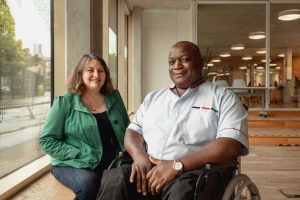The call to shift power and change how INGOs operate is at least a generation old. Yet little progress has been made. There will be many reasons for this but perhaps the simplest explanation is that transformation is hard because power doesn’t give up power easily.
At ADD International, we were specifically appointed as CEOs with a remit to transform the organisation. Unlike many of our peers, we had the backing of our board to co-create a bold plan which de-centres us and asserts the power and priorities of movements and activists. As part of this transformation, we’re committed to regularly sharing our on-going learning and to being honest about the challenges we’ve encountered.
This is not to suggest that we’ve found the blueprint, but to encourage greater transparency in discussing challenges and failures, and to collectively work through the systemic obstacles and practical issues INGOs face when shifting power.
Early in our process, we realised the need for internal clarity on what we meant by ‘decolonising our work’ and ‘shifting power’. These are big concepts, often open to interpretation, which meant it was important to create collective understanding on their meaning in the context of who we wanted to be. For us, decolonising and shifting power means disrupting the dominant funding system especially in the disability justice space.
For too long, money has flowed to organisations initiated and registered in Europe or the US in a way that mimics colonial power structures. We want to change this, so our strategy is focused on ‘decolonising’ this system and getting funding directly to activists and movements and, importantly, enabling them to decide what to do with it. This is our north star which provides us with clarity. Without this type of clarity, specific to the organisation, there’s a danger that
different parts of the organisation pull in different directions under a shared but poorly-defined ambition, failing to deliver meaningful change.
‘The issues of power are systemic, requiring wide scale change and realignment of how we think about our role. This means isolated and controlled tweaks here and there provide little insight into the scale of change required. Rather there’s a need to embrace an intuitive process that holds our relationships with the activists and movements we exist to support as a guiding compass..
Shifting power is often a difficult message for staff, not just those based in global minority headquarters. In line with our commitment to enabling activists and movements to have more power and decision making, we have consciously not attempted to ‘localise’ our previous country infrastructure, in the way that some INGOS have done. This means that ADD’s global majority staff are not those we are intentionally seeking to move more power too, indeed, in time, we will decrease our overall staffing and therefore have less of them.
On a human level this can feel threatening and antithetical, especially when those employed by us in global majority countries imagined that shifting power would see them gain more influence. Again, this is why clarity is so important. Having listened to disability justice movements, we know we need to prioritise a power and resource shift from us, wherever we are located, to them.
To support the necessary transitions at both an individual and organisational level, we’ve also reorganised, so that roles previously viewed as UK ‘headquarters’ roles are now non-geography specific, thinking more globally about who ‘us’ is, and will be, going forward. This ensures more staff located in global majority countries will have greater power within ADD. We think about this as increasing the ways in which we share power within ADD.
This internal transition, which our co-leadership also reflects, is happening alongside the power ‘shift’ that seeks to move some types of decision making away from us as ADD entirely, and towards disability justice activists. Looking ahead, we also believe many of our excellent staff members who do leave ADD, will find new roles, hopefully in locally-led organisations which become better resourced as funding flows change.
Our overall aim of disrupting the dominant funding system means no longer centring our own growth. On joining ADD, we observed that over time the ‘professionalisation’ of its work had led to more and more of the organisation’s resources being invested in ADD doing things. If we’re to shift power, this needs to stop. Our new strategic framework deliberately envisages fewer staff in five years time – because we’re not here to do the work ourselves, we’re here to use our positional power to help enable resources flow to the movements themselves. Again, this is hard for many of our staff in the countries where we have traditionally worked.
The process of shifting power sheds light on all power dynamics and shows that they, like us, are to some extent part of the status quo. This takes us all into unknown and at times, uncomfortable territory, which in the short term can create resistance. Alongside our transformation, we also committed to completing existing work and to closing it out well. This is easier said than done.
As we all know, many restricted projects don’t result in full cost recovery so we are still subsidising them as we shift to a new model. This ‘please everyone’ transition can often feel impractical, frustrating, and exhausting. It no doubt contributes to the reason why so many other INGOs support the general principles of shifting power but end up co-opting the ideas and largely continuing business as usual.
We have repeatedly remarked that it might be better for INGOs to close and allow new shoots to grow into entities that can think and do differently from the start. This should be a live question for us all working in INGOs. While there is value in small pilots and prototypes, we need to be wary of trying to ‘projectise’ transformation processes.
The issues of power are systemic, requiring wide scale change and realignment of how we think about our role. This means isolated and controlled tweaks here and there provide little insight into the scale of change required. Rather there’s a need to embrace an intuitive process that holds our relationships with the activists and movements we exist to support as a guiding compass.
The perfect time to transform doesn’t exist which means it’s a case of taking the plunge and embracing the messy and complex business of dismantling power. In the spirit of transparency, it’s been tough – not least trying to lead and support teams through uncertainty – but our shared determination to get out of the addictive cycle of funding is starting to pay off. We’ve received investments from funders who understand and support the changes we’re making. This is validating and enables us to invest in our staff and better support them through the transition. Afterall a new way of being and doing requires change from us all.
Mary Ann Clements and Fredrick Ouko – are ADD International Co-CEOs








Comments (0)